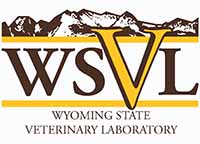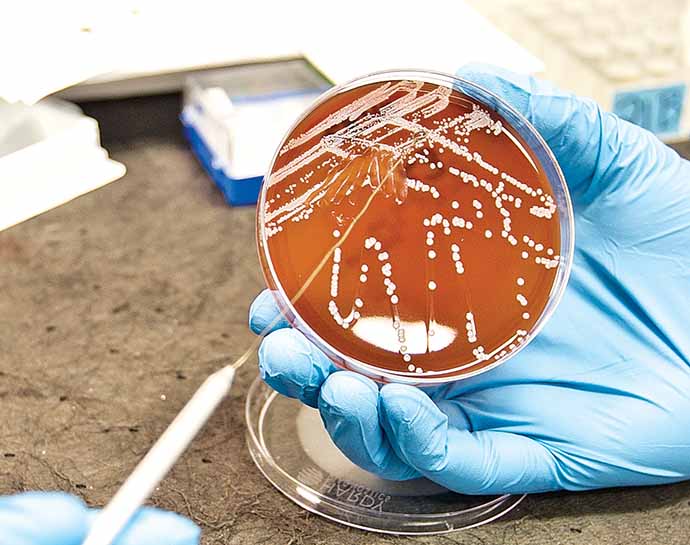Contact Us


Wyoming State Veterinary Laboratory
1174 Snowy Range Rd
Laramie, WY 82070
Phone: 307-766-9925
Toll Free: 1-800-442-8331
Fax: 307-721-2051
Email: vetrec@uwyo.edu

Announcements and Disease Updates
Announcements
- Beginning May 12th WSVL will be adding a $50.00 charge to all out-of-state rabies submissions. All in-state testing will remain free of charge. Please contact the lab at vetrec@uwyo.edu with questions.
- We will be switching to our summer hours, 7:30am to 4:30pm beginning on May 19, 2025 until August 22, 2025.
- We will be closed in observance of Memorial Day on Monday, May 26, 2025.
- New searchable fee schedule is now live! Check the Testing Updates section of the fee schedule for updates to testing and new tests we are offering.
-
We have been reviewing and refining our services based on client feedback and changes in the veterinary diagnostic industry. We are currently implementing several changes to our services and fee schedule that we hope will improve quality and client satisfaction. A Newsletter will be sent in February 2025 that includes these changes, along with other laboratory updates, but the list provided below covers those actively underway that we wanted to make you aware of:
-
Expanding data provided in your reports – Look for more complete antibiotic sensitivity results that include MIC data, CT data provided with your PCR results, and S/P (sample-to-positive) ratios included with some ELISA results.
-
Moving to a two-tier pricing schedule for our surgical biopsy service - we have received feedback that our biopsy pricing has made accurate up-front charging of your clients difficult. We are condensing standard surgical biopsies to either a small or a large biopsy, please see details in the attached flyer, which we hope will make charging your clients on the front end more straight forward. We ask that you contact us at vetrec@uwyo.edu or at 307-766-9925 if you have any questions about this change – we are happy to work with you to ensure your entire staff understands the way this new pricing structure will work! We will continue to do all histology in house.
-
Testing panels and greater detail on our fee schedule – We are actively developing panels, which are grouped testing for a given species and clinical presentation. Examples include calf diarrhea, canine respiratory, and equine neurologic. These should provide more efficient diagnostics and cost savings over individual test selections, but individual testing will also remain available. We are also clarifying fees and expanding descriptions on the fee schedule to make sample selection easier and more transparent.
-
Referring Out All Clinical Pathology Testing - WSVL will no longer be offering cytology and clinical pathology services in-house. Histology will still be performed in house. WSVL will forward all cytology and clinical pathology samples to CSU starting Dec 1. For the month of December, WSVL will continue to charge our clients WSVL rates for testing and shipping. The full cost of these services from CSU, including shipping and handling, will be charged to clients beginning Jan 1, 2025. For faster turn-around times and to not incur additional shipping and handling fees, direct submission to CSU or another laboratory for this testing is recommended.
-
Expanding Your Shipping Options – WSVL will be adding FedEX Priority Overnight as an additional shipping option on our portal. Depending on your shipping needs, this option may be cheaper and/or faster than UPS, and we are glad to offer both!
Please provide feedback and let us know if you have any questions about the described changes.
-
Disease Updates
Brucellosis Identified in Park County Cattle Herd
Routine brucellosis surveillance testing has identified a brucellosis affected cattle
herd in Park County. Laboratory testing was conducted at the Wyoming State Veterinary
Laboratory (WSVL), Laramie and results were confirmed at the National Veterinary Services
Laboratory (NVSL) in Ames, Iowa.
Two informational meetings on brucellosis, hosted jointly by WLSB, Wyoming Game and Fish, Wyoming State Veterinary Laboratory, and USDA APHIS, will be held this fall. See below for the meeting details. All livestock producers, veterinarians, extension specialists, meat processors, and others are encouraged to attend. Click the heading link for more information.
Two informational meetings on brucellosis, hosted jointly by WLSB, Wyoming Game and Fish, Wyoming State Veterinary Laboratory, and USDA APHIS, will be held this fall. See below for the meeting details. All livestock producers, veterinarians, extension specialists, meat processors, and others are encouraged to attend. Click the heading link for more information.
Anthrax Confirmed in Carbon County Cattle - September 2024
Anthrax has been confirmed in multiple beef herds located in Carbon County, Wyoming.
This is the first confirmed anthrax in Wyoming cattle since the 1970s. Wyoming State
Veterinary Laboratory confirmed the diagnosis late Saturday afternoon, August 31.
Both WSVL and private veterinarians were essential in the diagnosis of anthrax impacting
several herds in the region.
Highly Pathogenic Avian Influenza (HPAI) Detections in Livestock
On April 24, USDA announced a Federal Order (FO) as part of its ongoing efforts
to protect the U.S. livestock industry from the threat posed by highly pathogenic
avian influenza (HPAI or H5N1) in dairy cattle. The Federal Order (FO) requires mandatory
testing prior to the interstate movement of lactating dairy cattle and mandatory reporting
of positive influenza A test results in livestock. USDA is taking these actions to
address any risks to animal health, public health, and the safety of our food supply.
Plague and Tularemia in Wyoming - September 2023
This week, the Wyoming State Veterinary Laboratory (WSVL) has diagnosed Yersinia pestis, the bacteria responsible for Plague, in an Albany County cat. The cat is an indoor/outdoor pet who hunts rodents. It is responding well to treatment and no human illness has been reported with the case. So far in 2023, two cats and a prairie dog have tested positive for Plague in the State of Wyoming. Plague is a serious infection that is deadly for people and pets if not immediately treated with antibiotics. See the distribution map at the link in the title.
Tularemia is another bacterial infection that is a serious threat to humans and pets. In 2023, the WSVL has diagnosed four cases of Tularemia in pets and wildlife in Wyoming. Both Plague and Tularemia are transmitted to pets from ingesting infected animals or fleas bites coming from infected animals. Symptoms of infection include fever, lethargy, coughing, swollen lymph nodes, especially under the jaw, and decreased appetite. Vomiting and diarrhea are also possible. Recommendations for prevention are keeping fleas off of indoor and outdoor pets by applying flea control products. Animals that free roam outdoors are more likely to contact plague or tularemia infected animals. If pets appear sick, seek veterinary care as soon as possible.
West Nile Virus Cases Update - September 2023
During the month of August and the end of July, the Wyoming State Veterinary Laboratory (WSVL) has detected serologic and PCR evidence of West Nile Virus (WNV) in 24 equine submissions from 10 Wyoming counties. In the past 5 years and in comparison to this year, the laboratory has detected lower numbers of cases serologically. 2018 also had increased detection numbers with acute phase antibody detection in 14 equine submissions. From 2019 to 2022, there were a total of 11 cases with detected WNV acute phase antibodies (2019- 3 cases, 2020- 0 cases, 2021- 5 cases and 2022- 3 cases). In the past 5 years, WNV has not been detected with PCR in any equine submissions. See the distribution map at the title link.
West Nile Virus is transmitted by mosquitos. WNV affects humans and other animals, especially birds and horses. Affected animals can present with a variety of clinical signs varying from no clinical disease to potential lethal encephalitis, inflammation in the brain. Horses can recover from infection but can be left with long term side effects. Many of the recent WY cases have had a variety of neurologic signs, including generalized or hind-end weakness, lethargy, incoordination and stumbling as well as muscle twitching, drooping head and abnormal sensitivity to outside stimuli. Some of the horses have had a fever and most of the horses have either no or a poor vaccine history. Annual vaccination is the best form of protection as well as implementation of mosquito control and decreased exposure to mosquitos.
Strangles Cases Update - August 2023
The Wyoming State Veterinary Laboratory (WSVL) has isolated Streptococcus equi ssp. equi in three separate cases from Southeastern Wyoming during the month of August. The related bacterial disease is also known as Strangles. Strangles is a reportable highly contagious upper respiratory disease in horses that can present with nasal discharge and abscessed lymph nodes. Transmission of the bacteria happens generally from nose-to-nose contact with infected horses but can also occur with shared tack and feed containers.
Since 2020, 38 cases of strangles have been detected at our lab, out of 11 different Wyoming counties (please see case map at the link in the title). While there is no clear seasonality, we already detected 9 cases in 2023.
Brucellosis Confirmed in Sweetwater County - June 2023
The Wyoming State Veterinarian received confirmation from the National Veterinary
Services Laboratory, Ames, IA, that seven cattle originating in a herd from Sweetwater
County, WY, were positive for brucellosis. The brucellosis positive cattle, also known
as reactors, were initially identified at the Wyoming State Veterinary Laboratory
(WSVL) in Laramie. The herd was identified on a routine slaughter sample submitted
as part of Wyoming’s voluntary custom slaughter brucellosis surveillance program.
The sample indicated a possible brucellosis reactor, prompting testing of the herd.
Highly Pathogenic Avian Infuenza in a Domestic Cat
WSVL diagnosed highly pathogenic avian influenza (HPAI) virus in a barn cat near Thermopolis,
WY. We know that wild birds, particularly water fowl, have been affected in large
numbers by HPAI, but in recent months we have detected the virus in wild carnivorous
mammals including mountain lions and a red fox. This is the first report of HPAI in
a domestic cat in Wyoming, and it likely became infected from ingesting meat from
wild waterfowl. Clinical signs for mammals include those that are associated with
neurological signs including change in behavior, decrease in awareness of surroundings
and loss of energy. These signs may be indistinguishable from an animal affected with
rabies. For testing of domestic species, we recommend your veterinarian submitting
the whole carcass. Please contact the Wyoming Game and Fish Dept (WGFD) for disposal
recommendations for any dead waterfowl your pets can access, or to report dead or
sick wild carnivores. As the HPAI outbreak continues, please make sure that you are
using gloves and masks when handling sick or dead mammals and birds. Report any sick
wildlife to the WGFD through the online reporting tool at the link in the title.
Mycoplasma bovis Outbreak in Pronghorn
The WSVL received three pronghorn carcasses from the Wyoming Game and Fish Department
(WGFD) in early March, following reports of multiple pronghorn mortalities in the
Pinedale area. All three pronghorn had severe pneumonia caused by Mycoplasma bovis.
This bacterium has been associated with other high mortality outbreaks in pronghorn
near Gillette in 2019 and 2020. The estimated number of pronghorn mortalities at
this time is 300, and the WGFD is working to remove carcasses so that other healthy
animals are not exposed. While Mycoplasma bovis causes fatal pneumonia in pronghorn
and bison, it typically does not cause severe disease in cattle. The WGFD has an
online reporting tool for the public to utilize, if they see any additional sick pronghorn
in other areas of the state. Click the link in the title.
Contact Us


Wyoming State Veterinary Laboratory
1174 Snowy Range Rd
Laramie, WY 82070
Phone: 307-766-9925
Toll Free: 1-800-442-8331
Fax: 307-721-2051
Email: vetrec@uwyo.edu









